AN AGED INTERVIEW WITH YOUR HOST
Namely, the Equally Antique R.C. Harvey
FOR ME TO PUBLISH AN INTERVIEW with myself is, without question or quibble, a self-indulgent excess without equal at this website. (And since the whole website is a self-indulgent exercise, that’s saying a lot.) To begin with—quite apart from the egotism it betrays—what could any reader expect to find herein that he/she doesn’t find in the utterances I commit in Rants & Raves every fortnight or so? What could I possibly say in this interview that I haven’t said, in one way or another, in the copious postings we’ve lofted into the digital ether over the last dozen or so years?
Probably not much. But, as it turns out, a little. I ran across this interview last month and found things in it that, actually, I haven’t said elsewhere. Moreover, here, I’m answering someone else’s questions rather than expounding at my own provocation, so the point of embarkation is different, and there are some topics—or aspects of topics—that I haven’t actually voiced an opinion on in the regular outings of R&R. (Surprising as it may seem what with my capacity for unfettered loquaciousness of the colossal dimension.) The interlocutor presumably asked questions to find out things he’d always wanted to know; and maybe in that, he speaks for you, too.
Herewith, then, the September 8, 2004 interview conducted by Craig R. Boldman at the website of the Great Lakes Chapter of the National Cartoonists Society, http://www.ncs-glc.com/GLC/rcharvey/rc001.html (where you can find other, much more fascinating subjects):
Craig Boldman (addressing fellow members of the Great Lakes NCS chapter): If you’ve picked up more than a few comics-related magazines, you've surely encountered the writings of Robert (R.C.) Harvey. Currently, the comics historian and critic's writings can most readily be found at his fine website. Bob is also an accomplished cartoonist in his own right, and we’ve included a couple examples here at the beginning.
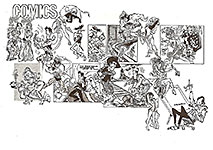 |
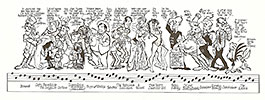 |
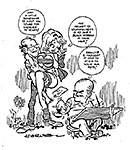 |
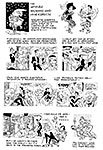 |
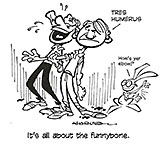 |
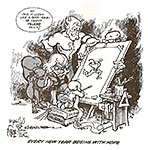 |
[RCH exegesis: The first exhibit is an old letterhead of mine, decorated with some of the characters I created; then comes a Christmas card that lines up all the characters I created over the years (except those I conjured up while in high school, the subject of some future self-indulgence here); next, a caricature of Milton Caniff, whose biography I wrote; then a severe condensation of an episode in my Fiddlefoot comic strip (reprised for a Christmas card); then two of my favorite cartoons—an illustration depicting the funnybone and another drawn at the first of a new year to celebrate comic book superhero adventures in which the words do not overpower the pictures—a tendency all too evident a couple decades ago when I made this picture.]
We recently had the chance to ask Bob how he sees the state of affairs on the comics page. For his POV, scroll on!
CRB: Can you be that guy who looks at a comic strip as a simple entertainment, or is the critical, "deconstructing" eye always on to some degree? Is there a trade-off in being so deeply into a subject you love?
R.C. Harvey: No trade-off. I always read the comics for entertainment. I appreciate them on various other levels, depending on the cartoonist; but I read them for entertainment. Sometimes, after having read a strip, I'll say to myself: now that was well done for thus-and-so a reason (something involving the craft or artistry of the medium). Sometimes—alas, rarely—the entertainment is closely bound up in the artistry at work. It would be nearly impossible to read 9 Chickweed Lane, for instance, without being conscious of the visual magic Brooke McEldowney is displaying. Calvin and Hobbes, on the other hand, I can read for the sheer, unadulterated joy I take at Bill Watterson's sense of humor. Ultimately, this leads us into the very essence of cartooning: where would the comedy in Napoleon be without Clifford McBride's ingenious depictions of the dog's face? And it's V.T. Hamlin's pictures of Alley Oop that make the characterization work—a stupid, comedic hero who is also canny enough to win at just about any physical or military undertaking.
CRB: Speaking not as a comics historian, critic or scholar, but simply as a guy sitting down to his morning coffee and Raisin Bran: What would be your ideal comics page to read at breakfast?
RCH: I assume you want me to list the comic strips I read for pure pleasure rather than research, but I don't think I can separate out of my psyche the critic or the scholar or the historian. Well, not completely.The comics I read for the fun of it? Or, to put it another way, the comics I look forward to seeing every day [or would if they were still being published]. Well, the list is pretty long (and probably incomplete): Pogo, Gordo, Calvin and Hobbes, Liberty Meadows, Conchy, Romeo Brown (Jim Holdaway), Terry and the Pirates/Steve Canyon, Captain Easy, Peanuts, Alley Oop (Hamlin), 9 Chickweed Lane, Rose Is Rose (Brady), Fastrack, Over the Hedge, Polly and Her Pals, Quincy, Tiger, Zippy, Gasoline Alley, Skippy, Barnaby, Popeye (Segar), Oaky Doaks, Mamie, Bringing Up Father, Male Call, Gaston LaGaffe (Franquin), Natacha (Walthery), Zits, Red Ryder, Modesty Blaise, Krazy Kat, Mary Worth (when Ken Ernst was drawing it), Judge Parker (only Dan Heilman's), Hopalong Cassidy, Mutts, Tarzan (Hogarth), Napoleon, The Norm, Bloom County, Doonesbury, Boondocks, Piranha Club.
CRB: Your Comics Page is a pretty splendiferous list.
RCH: It's a longer list than any single page would accommodate (And a big breakfast!—CRB). But why are comics confined, in newspapers, to just one page? Or two? Newspapers don't apply a similar rule to the Classifieds, right? So why the comics?
CRB: Sounds sensible (and it even happens in isolated cases: Doonesbury on the editorial page, Tank McNamara on the sports page, the occasional spillover onto the classified page) but is a sensible solution like that likely to happen? Michael Jantze talks about the shrinking newspaper market and the diminishing slots available for strips. Where do you see the future of newspaper comics heading?
RCH: Over the long haul, I think comics will thrive better than ever. Newspaper comic strips are, clearly, tied to the future of newspapers. And in my view, newspapers will eventually become little more than the carrying mechanism for grocery store coupons (without which advertising, newspapers would have expired years ago). The "news function" of newspapering will be taken over by two other venues: spot news reporting, breaking news, will be picked up by tv news (it already has taken over much of this sort of news coverage); in-depth news coverage—analysis and background—will fall to magazines, which have time to develop such material. Newspapers can't afford to pay for the kind of talent that can do investigative journalism or background stories or analysis; so, as I say, that'll fall to weekly or monthly magazines. What's left for newspapers? Local news (club meetings) and grocery store coupons. Reporting staffs will be pared to nothing, and newspapers will subsist on wire service news copy and syndicated feature material. That means, more comic strips, not fewer.
CRB: How do you see the internet and webcomics figuring into things?
RCH: Cartoonists will ply the Internet in vast numbers. The essential problem there, at the moment, is, as someone said, comics are everywhere on the 'Net but you don't know where to find them. You know where they are in newspapers: they're in the comics section. Nothing, yet, in that category on the Web. There will be eventually.
But syndicated comics will survive because (1) they're edited and screened for popular consumption (something not done on the Web) and (2) they're conveniently distributed and (3) due to the selection processes of syndicates, they're generally speaking "better" than many Web comics. Anybody with a computer and a modem can get his/her comics on the Web; and the quality of material there often reflects this easy access. There's a lot of amateurish junque on the Web. Some of it gets into newspaper syndication, too—alas; but syndicates are still screening and selecting. They don't take "everything" like the Web does.
CRB: Is newsprint a vital part of the comics experience for a 'classic comics' fan like yourself, or is a comic strip a comic strip a comic strip, whether it's in the newspaper, in a paperback book, a small press publication, or as pixels on a monitor?
RCH: I like paper, of course, being of the geezer generation. More interesting than paper, however, is the ink on it: paper-based comics have the potential of character of linework—lines that wax thick and wane thin, or get rickety or frazzled, whatever. The quality of linework you find in, say, Frank Pauer's work, you don't often find on Web comics, which tend to be drawn with a uniformly thick or thin line. That means the visual, the image, is boring—to me, at least. That's not a quality inherent in the pixels, though: some Internet comics are wonderfully various in the linear department. Tatsuya Ishida’s Sinfest, for instance. But it still seems to me that you get better linear treatment on paper than you do via computer. Color is another story. Computer color is often dazzling. But the lines around the colors are still boring, too often.
CRB: What do you think of the alternative routes some artists are taking to get their work before the public: For instance, Pibgorn, PVP, the keenspot.com strips. Will any of these approaches become the mainstream?
RCH: The routes are fine. But the product—the linear dimension, as I said—is often disappointing. And the quality of the work—its humor, for instance—is often pretty thin, too.
CRB: Jumping subjects: Of all the favorite strips you mentioned, how did Gordo separate itself out from the pack to become a major project for you? [Harvey wrote a book about Gordo and its creator, Gus Arriola; see book store for description.]
RCH: Two things. First, Gordo was my passion as a teenager aspirant to be a cartoonist. I studied the strip and Gus Arriola's drawing style. And his style influenced mine for years. (Probably still does.) Like most neophyte cartoonists, I apprenticed by copying the work of the established cartoonists. For years, I copied them exactly: I drew Popeye, Pogo, etc. But by the time I fell in love with Arriola's drawing style, I was adept enough to ape the style, not the actual pictures. So I never copied Gordo or the Poet or any of his characters. Instead, I tried to ape the mannerisms of his actual drawing—the waxing and waning of his line. So my interest and affection for Gordo was higher than it is for many comics: it was so much a part of my own apprenticeship.
Second factor, though, was just as important: I met Gus, finally, in 1998. I was on the cusp of finishing up another book and looking for a new project. And a book on Arriola and Gordo would give me the opportunity to get to know the idol of my youth better. So I suggested it, and he agreed. Simple. [When he agreed, I reached out and we shook hands, and as we did, I said: “And we’ll split the profits, 50/50.” I’ll never forget: he looked surprised. I suppose that with most projects like this, the “author” takes the money to the bank. But I knew I wanted to include lots of Gordo strips in the book—whole continuities, f’instance—and Gus and created those, so at least half the content of the book was his. Why wouldn’t he get half the profits?]
CRB: And, a more pragmatic question, for those who may tempted to visit, but haven't quite brought themselves to click the link yet: How would you describe your site (in 25 words or less?!)?
RCH: To start with its URL, www.RCHarvey.com consists of three parts: Rants & Raves, an online every two-three weeks magazine of reviews and news (whatever gives me fits) and commentary about comics and cartooning; Harv's Hindsights, an occasional (about once a month) article or essay, in-depth, on a cartoonist (biography and analysis of work) or some facet of cartooning; and, finally, descriptions of my own books, with ordering mechanism. More than 25 words. Too bad.
RCH some more: And now, to wind up this frivolous episode of grandiose self-exultation, here are a few of my cartoons from the latter lewd lady phase of my so-called vocation.
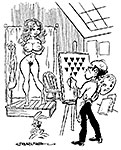 |
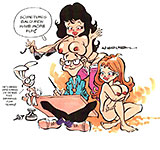 |
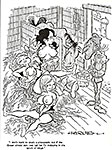 |
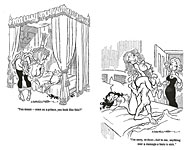 |
3.jpg) |
10.jpg) |
